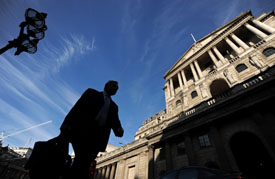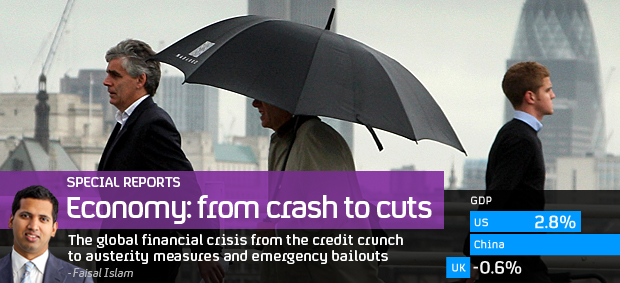Can the Bank of England tame credit boom and bust?
Exclusive: A key Bank of England official tells Faisal Islam the bank would have “pressed the brakes” in 2004 before the credit crunch began.
Credit-addled Britain and its debt-soaked economy means that the Bank of England (BoE) will this week become, in my opinion, the most powerful entity in the land. Threadneedle Street will certainly assume more power than most Government departments at the inauguration of its Financial Policy Committee.
More than that, in an exclusive TV interview with Channel 4 News Economics Editor Faisal Islam, the Bank of England’s Andrew Haldane said from this week will be now accountable to “households and companies up and down the country”.
He said: “We are setting financial policy not as a means of protecting the banks but as a means of protecting the economy from the misfortunes of the banks and the wider financial system.
“Historically, too often we thought about our stakeholders as being people within a square mile of where we both sit. That with the advent of the Financial Policy Committee will change.”
Blog: When would you have stopped the boom? Key Bank of England official 2004/5
After years where we have become used to the BoE’s Monetary Policy Committee (MPC) setting monthly base interest rates, on Thursday its quarterly Financial Policy Committee (FPC) meets for the first time.

MPC vs FPC
Andrew Haldane, a key Bank of England official, occasional scourge of the banks, told Channel 4 News: “The way to think about this new FPC is as the twin sister of the MPC with the MPC seeking to safeguard money and the FPC seeking to safeguard credit. That does give the Bank a degree of influence, a degree of power over the financial system and the economy. I’m not sure whether it’s joystick control.
“Certainly early on we won’t know for sure quite how our actions will affect credit supply. But it’s certainly the aim. The aim is that someone needs to have their hands on the controls. It’s the absence of that someone, it’s the absence of a driver that led to the boom and bust that caused this crisis.”
Turning off the music
The boss of the world’s biggest bank a year before its credit-crunch collapse once famously said: “As l long as the music is playing, you’ve got to get up and dance. We’re still dancing.”
Certainly early on we won’t know for sure quite how our actions will affect credit supply. But it’s certainly the aim. Andrew Haldane, Bank of England
That music had blared since the 1980s when controls on credit were scrapped. A tidal wave of credit from the City went into houses, skyscrapers, holidays – all on the never never.
So this week Britain regains the powers to take the punchbowl away from the party, a committee that can turn off the music.
Andrew Haldane told Channel 4 News: “I think this is a pretty important ideological shift – as well as an important practical policy shift.
“You’re quite right that from the early Seventies onwards we used monetary policy to control the economy but we largely left to its own devices the fortunes of the financial system, the booms and the busts, the feast and the famines.
“That has now changed with the advent of the Financial Policy Committee in this country.”
Asian model
In practice this means the FPC will have the ability to instigate a whole range of interfering policies. I asked one of Britain’s top bankers, the Chief executive of Standard Chartered, Peter Sands, how he deals with these types of policies in his extensive lending in Asia.
He told me: “We can learn a lot from Asian countries. Asian countries did not suffer the same boom and bust that western countries did. Take Hong Kong – as a bank we cannot lend mortgages of greater than 70 per cent loan to value, so we’re very unlikely to get a situation of negative equity. It puts a constraint on the amount of borrowing in the economy.”
The Bank seems a little wary of setting off the political landmine of interfering with Britons’ inalienable right to mortgage finance to purchase their castles and studio flats.
“This isn’t a fifties sixties style quantitative restrictions on credit. This isn’t hire purchase controls and mortgage queues. What it is about is a touch on the tiller of credit when things are either too racy or when they’ve slowed down too fast,” said Haldane.
But that power is there, and was exercised in free market havens like Hong Kong as recently as last week. Haldane continued: “Importantly people focus on the punchbowl removal part of this, the slowing down of the party but as important a dimension is – to stretch the metaphor – bringing the punchbowl back into the room when the party’s going a bit flat.
“So right now it’s not as if risk taking is tearing away, it’s not as if credit is coursing through the arteries of the economy and in that situation it’s part of the FPCs role to turn up the music to turn up the volume and to cause credit to expand somewhat, risk taking to expand somewhat.”
Watering down the punch?
Peter Sands thinks that the Bank of England should go for some of the more direct macroprudential policies seen abroad.
“These will be unpopular decisions and they will be inherently political decisions.
When you want to take the punchbowl away from the party you want to take it away with a flourish and turn the music down. Peter Sands, Standard Chartered
“When you want to take the punchbowl away from the party you want to take it away with a flourish and turn the music down, you want people to know the party is over, and there’s a risk we go too much to technical solutions that are the equivalent of watering down the punch,” he told Channel 4 News.
Sands believes that now, with memories of the crisis still fresh, is the moment for the Bank to make the case for the democratic mandate for what will be unpopular decisions. At the Bank they describe the FPC as a fundamental break with the past and a change in Threadneedle Street’s loyalties.
Suggesting that Britain needs to be protected from its banks is strong stuff. So the obvious question is when would he have stepped in, in the past?
“It’s when that risk taking becomes generalised and too toppy that the FPC is meant to step in. If I think back to 2004/2005 that was the point where bank’s balance sheets were spinning – if not out of control then much faster than was the economy, then hopefully with hindsight at that point we’d have raised a flag and perhaps even backed up the raising of the flag with a pressing of the brake,” answered Haldane.
Would this have stopped the credit crisis?
Well that is remarkable. If the FPC had a time machine, it would have “pressed a brake” in 2004/5, and not just on consumer credit.
“One of the biggest checks in principle we might have wanted to impose back in 2005 would have been on lending between banks rather than to households and companies,” he added.
The banker, Mr Sands, has no illusions. “I think [these powers] would have made a huge difference, whether they would have completely prevented [the credit crisis] I don’t know, but they certainly would have made it far less damaging than it was.”
But just imagine what that means in practice. The Bank of England stepping in as the Housing boom took off before the 2005 election, where the feel-good of rising house prices drove Tony Blair to a third election victory. Is this right?
Does the Bank’s team of internal and external technocrats have the democratic legitimacy to deal with this?
It seems like an experiment, but one with little downside. The politics of this, though, could get messy. As Haldane told me: “This is new, this will be new, so the framework itself is largely untried, untested certainly in this country”. It most certainly will be tested in the years to come.
-
Latest news
-
Boy with profound learning disabilities reaches out of court settlement after abuse in residential school7m

-
India election: Modi rivals hit by string of raids and arrests7m

-
Can UK’s abandoned mines be used to build a greener future?5m

-
Sycamore Gap: Man pleads not guilty to felling iconic tree2m

-
‘Child poverty has not fallen since Tories came in’, says Gordon Brown5m

-





